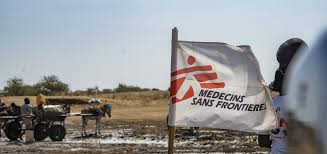Doctors Without Borders/Médecins Sans Frontières (MSF) has relocated its medical services from the border town of Burbeiye in South Sudan to Mattar in Ethiopia, in response to a sharp escalation in violence along the South Sudan–Ethiopia border.
The move comes amid a mass exodus of South Sudanese refugees, many of whom initially fled to Burbeiye—a town straddling the border—only to be forced to cross into Mattar as fighting intensified. On May 12, cross-border gunfire injured several people in Burbeiye, prompting an urgent humanitarian response. MSF treated nine war-wounded individuals that day alone, bringing the total number of patients treated for conflict-related injuries at the Burbeiye facility to 217 since the resurgence of violence in South Sudan’s Upper Nile state in February.
“Burbeiye has become critically dangerous. With thousands of people fleeing in a single night, it was clear we had to follow the people and meet the urgent medical needs,” said Joshua Eckley, MSF’s Head of Mission in Ethiopia.
MSF staff are now operational in Mattar, providing emergency care in response to a growing cholera outbreak and expanding humanitarian needs. Refugees arriving in the area report fleeing aerial bombardments and violence in Nasir and Ulang in Upper Nile state. One survivor treated by MSF suffered severe burns. Another, Nyayul, shared her harrowing journey:
“We moved through villages with no clinics, no medicine, not even water. I crossed the river to Burbeiye and then walked to Mattar. This is not life—this is survival,” she said. “When the bombs started falling, everyone ran. I lost my children in the chaos. I only have two with me now. I don’t know where the others are.”
The humanitarian situation in Ethiopia’s Gambella region, particularly in Mattar, has rapidly deteriorated. Between 35,000 and 85,000 people are estimated to have arrived, most living in overcrowded, makeshift shelters. Local infrastructure is overwhelmed. Recent health screenings show that over 40% of malaria rapid tests are positive. Nearly 7% of children under five are suffering from severe acute malnutrition, and among pregnant and lactating women, the rate of global acute malnutrition exceeds 14%. Waterborne diseases such as cholera and acute watery diarrhoea are on the rise, signaling an imminent public health crisis.
In response, MSF is scaling up emergency services in Mattar. These include primary healthcare, mental health support, nutrition screening, and care for survivors of sexual and gender-based violence.
“We urgently need action from donors, the UN, and humanitarian partners,” Eckley urged. “These communities are not just fleeing violence—they are fleeing the total collapse of every system meant to protect them. Healthcare, water, shelter—everything is in dangerously short supply.”
MSF calls on all parties to uphold humanitarian principles, ensure the safety of civilians and aid workers, and guarantee unimpeded access for humanitarian assistance. Immediate and scaled-up support is critical to prevent further loss of life and to restore basic human dignity to those displaced by the crisis.


COMMENTS